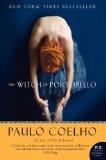The Witch of Portobello
by Paulo Coelho
268 pages
Stark Insider Rating: 9 out of 10
Buy: Amazon
This is the second novel I’ve read by Brazilian writer, Paulo Coelho. Similar to the first, The Zahir, this novel is also about the search for self, relationships with others and fulfillment in a world of conventions and material distractions. Coelho’s books offers a wonderful journey not only into the plot of his story, but also into self-discovery of the reader.
The novel starts off by claiming to be an exploration into the real woman behind the infamous “Witch of Portobello”. Athena, real name Sherine, is the main protagonist who at the onset of the novel has been brutally murdered.
The rest of the novel is set as transcripts of interviews with different people in her life leading to her death in an effort to reveal who she really was. This is performed artfully by Paulo Coelho who strings a cohesive, intriguing story of the development of the protagonist and simultaneously presents the complex and differing views of who Athena is through the eyes of all the characters.
Coelho sets out a framework for thinking about Athena and our own lives through the the character Deidre O’Neill, a doctor also known as Edda and a teacher to Athena.
“We women, when we’re searching for a meaning to our lives or for the path of knowledge, always identify with one of four classic archetypes.
The Virgin (and I’m not speaking here of a sexual virgin) is the one whose search springs from her complete independence, and everything she learns is the fruit of her ability to face challenges alone.
The Martyr finds her way to self-knowledge through pain, surrender, and suffering.
The Saint finds her true reason for living in unconditional love and in her ability to give without asking anything in return.
Finally, the Witch justifies her existence by going in search of complete and limitless pleasure.
Normally a woman has to choose from one of these traditional feminine archetypes, but Athena was all four at once.” — Deidre O’Neill (pp. 12)
Although Coelho, in an interview about the motivation for writing the book, noted he wanted to explore the feminine side of God, for me, its scope was even broader. It is a study into the personal and spiritual meaning of life, happiness and self-fulfillment in a society built on rules and conventions.
Athena’s business/career side as a successful real estate agent in Dubai is only lightly referenced, mainly to explain how she financially supports herself in her multi-year-long journeys to different parts of the world in search of who she is through dance, calligraphy and ceremonies.
When Athena finally finds her true self, a persona she calls “Hagia Sophia”, she is quickly faced with those in society that see her world-view as a threat to current conventions and religion.
Like his other novel, The Zahir, at the end of the novel, I was left with more questions than answers about my own life and search for self-actualization. And this is the very reason I love Coelho’s books. They are filled with though-provoking questions and new thought patterns about our assumptions and preconditions. The struggle between what we really are and what society tells us we must be.


